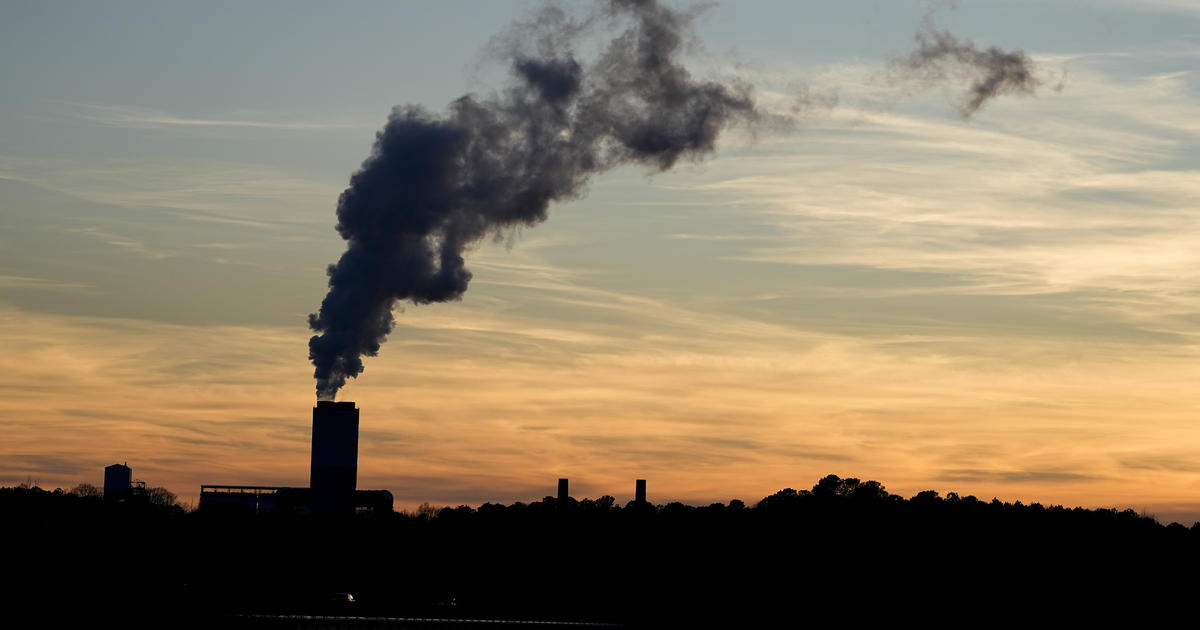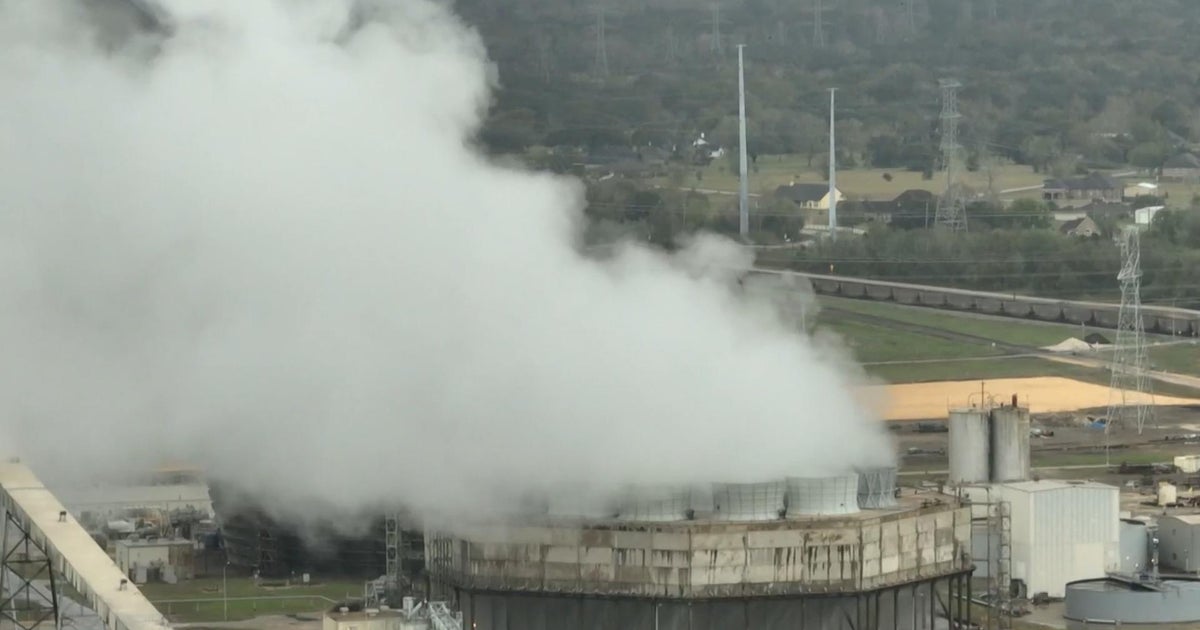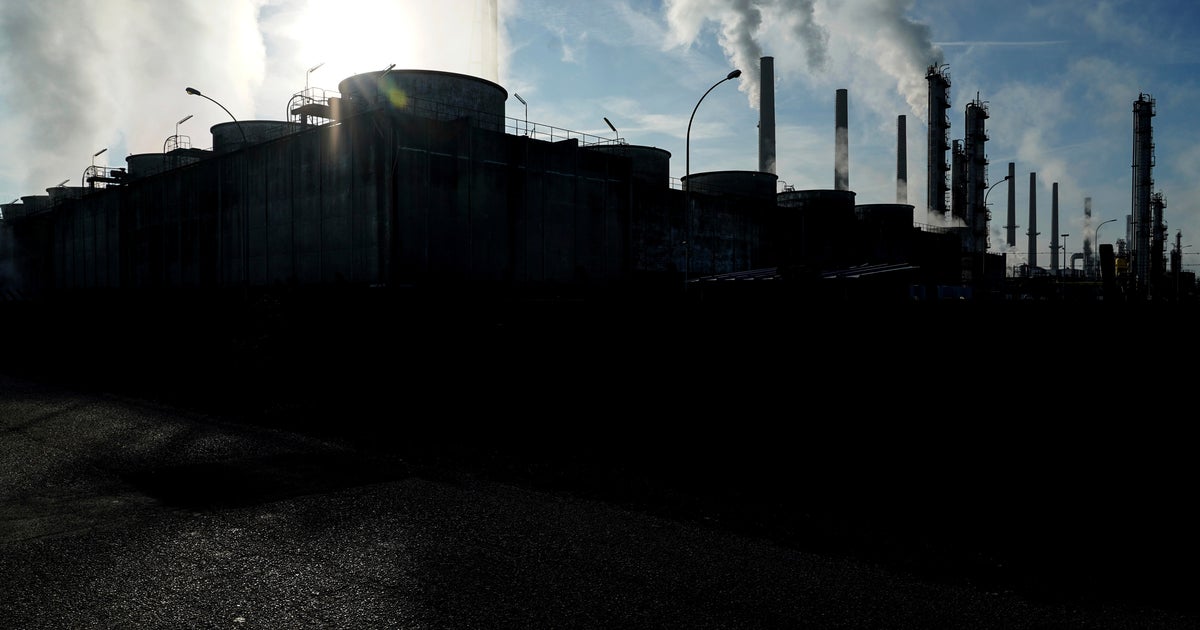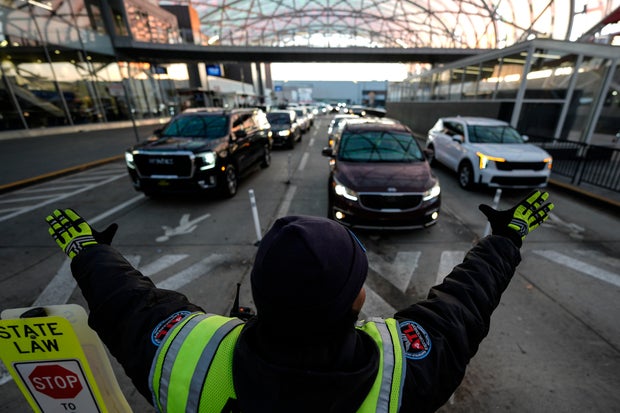CBS News
EPA issues toughest rule yet on power plant emissions, but it’s likely to face court challenges

Washington — Coal-fired power plants would be forced to capture smokestack emissions or shut down under a rule issued Thursday by the Environmental Protection Agency.
New limits on greenhouse gas emissions from fossil fuel-fired electric plants are the Biden administration’s most ambitious effort yet to roll back planet-warming pollution from the power sector, the nation’s second-largest contributor to climate change. The rules are a key part of President Biden’s pledge to eliminate carbon pollution from the electricity sector by 2035 and economy-wide by 2050.
The rule was among four separate measures targeting coal and natural gas plants that the EPA said would provide “regular certainty” to the power industry and encourage it to make investments to transition “to a clean energy economy.” They also include requirements to reduce toxic wastewater pollutants from coal-fired plants and to safely manage so-called coal ash in unlined storage ponds.
The new rules “reduce pollution from fossil fuel-fired power plants, protect communities from pollution and improve public health – all while supporting the long-term, reliable supply of the electricity needed to power America forward,″ EPA Administrator Michael Regan told reporters at a White House briefing.
The plan is likely to be challenged by industry groups and Republican-leaning states. They have repeatedly accused the Democratic administration of overreach on environmental regulations and have warned of a looming reliability crisis for the electric grid. The rules issued Thursday are among at least a half-dozen EPA rules limiting power plant emissions and wastewater pollution.
Environmental groups hailed the EPA’s latest action as urgently needed to protect against the devastating harms of climate change.
The power plant rule marks the first time the federal government has restricted carbon dioxide emissions from existing coal-fired power plants. The rule also would force future electric plants fueled by coal or gas to control up to 90% of their carbon pollution. The new standards will avoid 1.38 billion metric tons of carbon pollution through 2047, equivalent to the annual emissions of 328 million gas cars, the EPA said, and will provide hundreds of billions of dollars in climate and health benefits, measured in fewer premature deaths, asthma cases and lost work or school days.
Coal plants that plan to stay open beyond 2039 would have to cut or capture 90% of their carbon dioxide emissions by 2032, the EPA said. Plants that expect to retire by 2039 would face a less stringent standard but still would have to capture some emissions. Coal plants that are set to retire by 2032 would not be subject to the new rules.
Rich Nolan, president and CEO of the National Mining Association, said that through the latest rules, “the EPA is systematically dismantling the reliability of the U.S. electric grid.”
He accused Mr. Biden, Regan and other officials of “ignoring our energy reality and forcing the closure of well-operating coal plants that repeatedly come to the rescue during times of peak demand. The repercussions of this reckless plan will be felt across the country by all Americans.”
Regan denied that the rules were aimed at shutting down the coal sector, but acknowledged in proposing the power plant rule last year that, “We will see some coal retirements.”
The proposal relies on technologies to limit carbon pollution that the industry itself has said are viable and available, Regan said. “Multiple power companies have indicated that (carbon capture and storage) is a viable technology for the power sector today, and they are currently pursuing those CCS projects,” he told reporters Wednesday.
Coal provided about 16% of U.S. electricity last year, down from about 45% in 2010. Natural gas provides about 43% of U.S. electricity, with the remainder from nuclear energy and renewables such as wind, solar and hydropower.
Environmentalists laud EPA moves
The power plant rule “completes a historic grand slam” of major actions by the Biden administration to reduce carbon pollution, said David Doniger, a climate and clean energy expert at the Natural Resources Defense Council. The first and most important action was passage of the 2022 climate law, officially known as the Inflation Reduction Act, he said, followed by separate EPA rules targeting tailpipe emissions from cars and trucks and methane emissions from oil and gas drilling.
Together, the climate law and the suite of EPA rules “are the biggest reductions in carbon pollution we’ve ever made and will put the country on the pathway to zero out carbon emissions,” Doniger said in an interview.
The nation still faces challenges in eliminating carbon from transportation, heavy industry and more, said Abigail Dillen, president of the environmental group Earthjustice, “but we can’t make progress on any of it without cleaning up the power plants.”
Industry blasts them
Jim Matheson, CEO of the National Rural Electric Cooperative Association, called the EPA rule “unlawful, unrealistic and unachievable,” adding that it faced a certain court challenge. The rule disregards the Supreme Court’s 2022 decision that limited the agency’s ability to regulate carbon pollution under the Clean Air Act, Matheson said. It also relies on technologies “that are promising, but not ready for prime time,″ he said.
“This barrage of new EPA rules ignores our nation’s ongoing electric reliability challenges and is the wrong approach at a critical time for our nation’s energy future,” said Matheson, whose association represents 900 local electric cooperatives across the country.
The EPA rule wouldn’t mandate use of equipment to capture and store carbon emissions – a technology that’s expensive and still being developed. Instead, the agency would set caps on carbon dioxide pollution that plant operators would have to meet. Some natural gas plants could start blending gas with other fuel sources that don’t emit carbon, although specific actions would be left to industry.
Still, the regulation is expected to lead to greater use of carbon capture equipment. Only a handful of projects are operating in the country despite years of research.
Other new EPA steps
The EPA also tightened rules aimed at reducing wastewater pollution from coal-fired power plants and preventing harm from toxic pits of coal ash, a waste byproduct of burning coal.
Coal ash contains cancer-causing substances like arsenic and mercury that can leach into the ground, drinking water and nearby rivers and streams, harming people and killing fish. The waste is commonly stored in ponds near power plants. The EPA issued rules in 2015 to regulate active and new ponds at operating facilities, seven years after a disaster in Kingston, Tennessee that flooded two rivers with toxic waste and destroyed property.
Environmental groups challenged that rule, arguing it left a large amount of coal ash waste unregulated by the federal government. The rule issued Thursday forces owners to safely close inactive coal ash ponds and clean up contamination.
A separate rule would reduce toxic wastewater pollution by 660 million pounds annually, according to federal officials. It’s a reversal of the Trump administration’s push to loosen coal plant wastewater standards.
“For the first time, we have seen a comprehensive set of standards that protects the surrounding waterways from the extremely nasty water pollution that comes off these coal-fired sites,” said Frank Holleman, attorney with the Southern Environmental Law Center.
CBS News
As government shutdown looms, AAA predicts holiday travel record

Drivers and airline passengers without reindeer and sleighs better make a dash for it because it’s beginning to look like another record for holiday travel in the U.S. as the government shutdown looms.
The auto club AAA predicts that more than 119 million people will travel at least 50 miles from home between Saturday and New Year’s Day, which would top the previous holiday-season high set in 2019. The two weekends on either side of Christmas look to be some of the most crowded times on the road and at airports.
Trade group Airlines for America also foresees record travel, saying it expected U.S. airlines to carry 54 million passengers during a 19-day period that started Thursday and ends Monday, Jan. 6. The number would represent a 6% increase over last year.
A government shutdown that could start as soon as Saturday would likely be too close to the holidays to immediately affect flights and airport operations, but that might change if a shutdown dragged on.
David Zalubowski / AP
What will be the busiest travel days?
Airlines expect to have their busiest days on Friday and Sunday, and on Dec. 26, Dec. 27 and Dec. 29. Flight traffic is expected to be light on both Christmas Day and New Year’s Day. The slowest U.S. air-travel day this year — by a wide margin — was Thanksgiving Day.
The Transportation Security Administration expects to screen 40 million passengers over the holidays and through January 2.
About 90% of Americans traveling far from home over the holidays will be in cars, according to AAA.
“Airline travel is just really high right now, but most people do drive to their destinations, and that is true for every holiday,” AAA spokesperson Aixa Diaz said.
Gasoline prices are similar to last year. The nationwide average Thursday was $3.05 a gallon, down from $3.08 a year ago, according to AAA. Charging an electric vehicle averages just under 35 cents per per kilowatt hour, but varies by state.
Transportation-data firm INRIX says travel times on the nation’s highways could be up to 30% longer than normal over the holidays, with Sunday expected to see the heaviest traffic. Boston, New York City, Seattle and Washington, D.C., are the metropolitan areas primed for the greatest delays, according to the company.
Weather and other wildcards
Because the holiday travel period lasts weeks, airports and airlines typically have smaller peak days than they do during the rush around Thanksgiving, but the grind of one hectic day followed by another takes a toll on flight crews. And any hiccups — a winter storm or a computer outage — can snowball into massive disruptions.
That is how Southwest Airlines stranded 2 million travelers in December 2022, and Delta Air Lines suffered a smaller but significant meltdown after a worldwide technology outage in July caused by a faulty software update from cybersecurity company CrowdStrike.
Many flights during the holidays are sold out, which makes cancellations even more disruptive than during slower periods. That is especially true for smaller budget airlines that have fewer flights and fewer options for rebooking passengers. Only the largest airlines, including American, Delta and United, have “interline agreements” that let them put stranded customers on another carrier’s flights.
This will be the first holiday season since a Transportation Department rule took effect that requires airlines to give customers an automatic cash refund for a canceled or significantly delayed flight. Most air travelers were already eligible for refunds, but they often had to request them.
Passengers still can ask to get rebooked, which is often a better option than a refund during peak travel periods. That’s because finding a last-minute flight on another airline yourself tends to be very expensive.
“When they rebook you, they will pay for the fare difference. If my flight to visit grandma that I booked six months ago for $200 gets canceled, and I turn around and book a flight four hours from now for $400, I have to pay that difference,” said Sally French, a travel expert at consumer-affairs company Nerdwallet.
People traveling on budget airlines with fewer flights and no partnerships with other carriers may face a difficult choice in the event of a canceled flight.
“They will put you on the next outgoing Spirit or Frontier flight, but that could be a while from now. Sometimes waiting three days for that next flight is not going to work for you,” and paying more to rebook on a big airline might be worthwhile, French said.
Some airlines are taking advantage of a provision in the new Transportation Department rule that defined a significant delay as three hours for a domestic flight and six hours for an international flight. According to Brett Snyder, who runs the Cranky Flyer website, airlines that previously issued refunds for shorter delays — Delta, United and JetBlue, for example — are now using the government standard.
Delayed flights increase the risk that bags will get lost. Passengers who get separated from their bags should report it to the airline and ask what the airline will cover.
Would a government shutdown affect flights and airports?
A government shutdown could occur if Congress doesn’t pass a funding bill with a midnight Friday deadline. Most TSA workers at airports, air traffic controllers and customs agents are considered essential and would be required to work without pay in the event of a shutdown.
More uncompensated workers might call out sick the longer a shutdown lasts, which could lead to longer security lines and other delays. That appeared to be the case several weeks into a government shutdown that started in December 2019.
About 59,000 of the TSA’s 62,000 workers are considered essential and would continue working without pay during a shutdown, the TSA said in an email sent to CBS News. But a shutdown could cause delays at airports over the holidays, the agency warned.
“While our personnel have prepared to handle high volumes of travelers and ensure safe travel, an extended shutdown could mean longer wait times at airports,” TSA spokesman Carter Langston said in a statement.
AAA advises travelers to “continue with their holiday plans, even if the shutdown materializes,” spokesperson Diaz said. “Airport operations will continue as normal, but perhaps run a bit slower than usual, so travelers should be aware of that.”
Planning ahead for 2025
Airline fares were up 4.7% in November, compared with a year earlier, according to U.S. government figures. But early 2025 is a good time to start planning next year’s trips, including for spring breaks and summer vacations.
“Because travel is so popular, you’re not going to find anything that feels very rock-bottom, but January and February are great times to plan for March, April and May,” Laura Motta, an editor at travel-guide publisher Lonely Planet, said. “If you want to go to Paris in the spring, you need to be thinking about that in January.”
Mike Stewart / AP
CBS News
5 moves to make if you’ve racked up credit card debt this holiday season

Getty Images
Holiday credit card bills hit differently for many this year. With record-high credit card interest rates and compounding interest charges, holiday shopping expenses often snowball into overwhelming balances. When you account for gifts, gatherings and family travel, December’s routine credit card use can lead to a costly financial hangover.
The good news is you can get relief from that kind of debt before it spirals. We spoke with financial advisors and credit counseling experts about the most effective ways to dissolve seasonal debt. Here’s what they want you to know.
Find out more about your credit card debt relief options now.
5 moves to make if you’ve racked up credit card debt this holiday season
Regina McCann Hess, financial advisor and president of Forge Wealth Management, advises getting to the root of the problem before making any complex moves.
You can figure out how you racked up debt by looking at your spending and asking yourself the following questions:
- Do you have a budget? (If not, it’s time to create one)
- What have you been buying?
- Is your spending within your budget?
Taking stock of your credit is also critical.
“We always recommend an updated budget and review credit reports to get an accurate look at the situation,” says Martin Lynch, president of the Financial Counseling Association of America (FCAA). He mentions holistic credit counseling produces better outcomes than any other approach for his clients.
Once you understand your spending patterns and have stopped adding new debt, consider these moves to squash your holiday bills:
1. Consider a balance transfer
“Opening a credit card with 0% APR can give you temporary relief from high-interest [holiday] debt,” notes Tripp Bennett, a financial advisor at Northwestern Mutual. When you take the balance transfer route, you only make payments toward reducing the principal amount (instead of paying interest).
But Lynch warns this strategy works best when you can “aggressively pay down balances during the 0% rate [period].” Balance transfer fees usually range from 3% to 5%, and the related card rates increase significantly after the promotional period ends.
Explore the credit card debt relief options that could benefit you today.
2. Explore debt consolidation loans
Debt consolidation simplifies holiday credit card payments while lowering your interest rate (if you qualify). Bennett explains this involves taking out a loan to combine multiple high-interest debts into a single pre-set monthly payment with a lower interest rate. It streamlines your payments, helping you become debt-free sooner.
For longer-term debt relief, consolidation can provide substantial savings. Credit card counseling agencies’ debt management plans can last as long as 72 months, according to Lynch. This lets people pay off their balances at much lower interest rates than what credit cards typically charge.
3. Adopt the debt snowball or avalanche method
With the debt snowball method, you tackle your smallest balances first. Hess is an advocate for this approach, noting that “when you [do this], you [get] a few wins early on and build your confidence.”
The alternative is the debt avalanche method, which targets debts with the highest interest first. Either strategy can work well, but research both to choose an approach that fits your lifestyle.
4. Negotiate a lower interest rate with creditors
“Call your creditors [to] request a lower interest rate — it can only help you,” says Bennett.
When you make the call to negotiate, be prepared with the right information. He suggests emphasizing your history of on-time payments or mentioning competitive offers from other credit card companies as leverage. The worst your creditor can say is no. But you might be surprised by how much you could save with a single phone call.
5. Look into a home equity line of credit (HELOC)
Hess points out that a HELOC could be promising for handling holiday debt if you own a home. It can offer a lower interest rate than what your creditor is charging you — and flexibility with repayment.
According to Hess, you can create a payment plan that extends beyond a year if needed. This gives you breathing room while reducing interest charges. But consider this option carefully, as it uses your home as collateral.
The bottom line
Getting rid of credit card debt requires acting now and having a clear long-term plan. To help you stay on track, Bennett recommends identifying your triggers for overspending and setting up automatic payments to guarantee consistency. And if managing debt is causing daily stress, debt assistance options can offer some structure and relief.
Start by researching debt relief companies and comparing their services. But don’t stop there — create a realistic budget that prevents future debt while building an emergency fund. Whether you tackle the debt alone or seek professional help, the key is taking control today before holiday bills become a year-round burden.
CBS News
4 simple ways to free up more money in your budget next year

Getty Images
With lingering high prices from inflation, soaring interest rates on credit cards and loans and the pressure of holiday gifting upon us, cash is tight for many Americans.
It doesn’t have to be that way, though.
According to experts, there are many ways you can free up funds going into the new year and ease that budgetary stress — even as the holidays close in.
Find out how a debt relief program could free up more money in your budget.
4 simple ways to free up more money in your budget next year
Are you looking to free up money as we head into 2025? Here are four ways pros say to do it.
Take a hard look at your expenses
If your budget is feeling tight, analyzing your expenditures is always a great place to start, or as Stephan Shipe, owner of Scholar Financial Advising, puts it, “perform a post-mortem on your 2024 expenses.”
Start a spreadsheet, and make note of all you spent in the last couple of months — detailing the amount and what it went toward.
“The easiest way to reduce expenses thoroughly is to evaluate monthly subscriptions and make sure you are not paying for services you no longer use,” says Curt Scott, president of Scott Financial Group. “Smartphone apps, streaming services, cell phone add-ons, gym and other memberships can add up very quickly and account for a substantial portion of someone’s disposable income.”
You can also look for new providers, like a new insurance company for your car or home insurance policies or a new internet or cable company, as they could offer lower pricing than what you’re currently paying.
“I find that people typically forget that they have the ability to negotiate, too,” Shipe says. “Ask for discounts for bundling services or negotiate new rates with providers.”
Explore the debt relief options available to you here.
Refinance or consolidate your debts
If you have a lot of debt in your name, reducing what you pay on those debts can help free up cash, too.
One option is to refinance your debt, which would allow you to potentially reduce your interest rate and monthly payment. This may be an option on mortgages, car loans and even student loans.
After all, the three rate cuts that the Federal Reserve has conducted in 2024 have resulted in rates dropping by a full percentage point.
“With this level of reduction, it may be in your financial interest to refinance any debts acquired prior,” says Troy Young, founder of Destiny Financial Group.
Consolidating your debts is another strategy. This is when you use a lower-rate loan to pay off all your debts and card balances, essentially rolling them all into one lower monthly payment.
“You can also explore using a balance transfer from one credit card — normally a high-interest credit card is 19%-plus — and transferring the balance to a credit card that allows 0% interest for a period of time,” says Jordan Mangaliman, founder of GoldLine Financial. “The 0% interest rate is typically valid for 6 to 12 months, which gives you more time to pay off your debt without any interest.”
Sell, sell, sell
You can also consider selling items you no longer use or, as Scott recommends, “items that new Christmas gifts can replace.”
“Reselling items has become a huge market,” Mangaliman says. “You can sell old items you may not need or use like watches, clothing, and even a car that you may not be using.”
Just make sure you’re realistic about what you’ll get from those sales, Scott says.
“While you won’t recoup 100% of the original cost, you may be able to get $0.30 on the dollar by selling items you no longer need,” Scott says. “This is a great way to make room for new toys, clean out the closet, and repurpose things you no longer need or use.”
Adjust your W-4
If you got a tax refund this year, you’re essentially “providing the government an interest-free loan,” Young says, and keeping less cash in your pockets throughout the year.
“If your refund in 2023 was, say, $1,200, on average, you loaned the government $100 per month,” Young says. “What could you do with an additional $100? If that refund is $3,000 you are looking at $250 per month.”
To prevent this in 2025, talk to your HR office and ask to adjust withholdings on your W-4 form. If you’re not sure how much of an adjustment to make, talk to your tax advisor. They can help you calculate the appropriate amount for your goals and tax liabilities.
The bottom line
If you do manage to free up cash, Young says to make sure you’re careful about where you put those extra dollars.
“Don’t take that savings and spend it, consume it,” Young says. “Apply it towards debt elimination, a savings goal, an investment plan, or retirement.”
And if debts are what’s holding you back from your financial goals, explore debt relief options like debt settlement, debt consolidation or a debt management plan. Talking to a financial advisor or credit counselor can also help.











